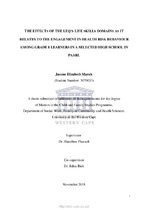The effects of the LEQ’s life skills domains as it relates to the engagement in health risk behaviour among grade 8 learners in a selected high school in Paarl
Abstract
Adolescence can be understood as the transitional period between childhood and adulthood.
During adolescence individuals tend to experiment and discover who they are in terms of their
unique social identity and are more susceptible to health risk behaviour engagement. Health
risk behaviour place individuals at risk for numerous health complications. The most common
forms of health risk behaviours are smoking, drinking, illicit drug use, risky sexual behaviour,
violence and physical inactivity. Life skills development has been proven to reduce many
health risk behaviours in adolescents. The Life Effectiveness Questionnaire (LEQ) is a
psychometric instrument which has been developed to measure life skills. Social Cognitive
Theory posits that people are not driven by inner forces nor are they controlled by external
stimuli, rather there is a reciprocal triadic relationship where the environment, cognition and
personal factors influences learning through observation. When in the presence of their peers,
adolescents are more likely to engage in health risk behaviour because of peer influence and
immediate rewards. This study aimed to study the effects of the LEQs life skills domains as it
relates to the engagement in health risk behaviour among Grade 8 learners in a selected high
school in Paarl. This study used a quantitative methodology with a cross-sectional design
employing written surveys. The sample consisted of 104 Grade 8 learners. The data was
collected using self-reported questionnaires. One was the LEQ (Appendix 5 and 6) which
measures life skills and the other was the Youth Risk Behaviour Surveillance Survey (YRBSS)
(Appendix 7) which measures the prevalence of health risk behaviour engagement. The data
was analysed using the Statistical Package for Social Sciences V24 (SPSS). The results
suggested that there is still a high prevalence of health risk behaviour engagement among Grade
8 learners with increases evident in some of the health risk behaviours.

